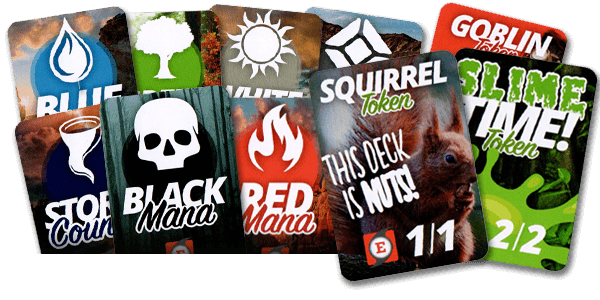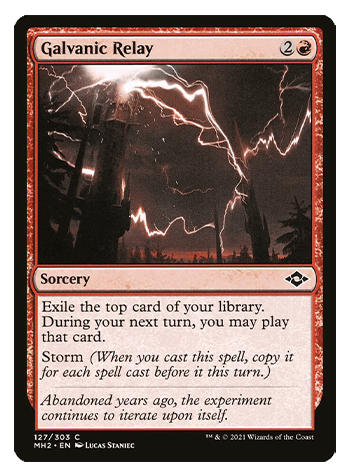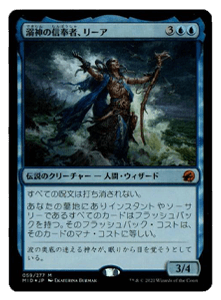RUG Delver is a tempo deck that tries to use its resources to keep the opponent from gaining traction to set up their game plan. It then tries to kill the opponent before they regain their balance. The deck does this by playing cards like Stifle and Wasteland to destroy lands, cheap countermagic, and removal to stop the opponent all while putting on a fast clock with a Delver of Secrets.
In the past year, RUG Delver became one of the most popular decks thanks to the printing of Wrenn and Six. However, with the recent banning of Wrenn and Six, the question comes up whether RUG Delver will still be playable like it was in the past? I believe that it will continue to be a great deck and will definitely be playable moving forward. It’s shown time and time again that no matter what the format is that it can still compete. Wasteland, Force of Will, and Delver of Secrets is still a great recipe to win in Legacy. Instead of the slower variations with True-Name Nemesis and Wrenn and Six, I expect it to go back to its cheap and lean deck list with mainly free and one converted mana cost cards with the goal of being the most efficient deck in the format.
How does RUG Delver matchup against TES?
Delver of Secrets, Tarmogoyf – These are the primary creatures that RUG Delver uses to pressure the opponent’s life total. Once a creature is in play, RUG Delver will try to protect the creatures and disrupt the opponent with counterspells. The goal is to disrupt them just long enough for these creatures to win the game. That’s why the creatures RUG Delver plays have to be cheap and hard hitting.
Force of Will, Force of Negation – The only hard counters that RUG Delver plays, and definitely cards we have to consider when trying to combo off. Force of Will is something we should all be familiar with playing against in Legacy since lots of other decks also play it. Force of Negation is newer and less common, but a very similar effect for us. We will often need a discard spell or a naturally drawn Empty the Warrens to win through these counterspells.
Stifle, Wasteland – For those of us that have been playing a while, this isn’t a new suite of disruption. Beating these cards is less about what cards we draw, but rather our skill in how we play against them. Finding the balance between fetching a dual land immediately to play around Stifle or just holding up a fetch land to play around Wasteland is quite tricky and will take to master. It’s all about evaluating what you can afford to play around the most. There aren’t any hard rules for this, but whenever they are tapped out, if you can afford to fetch for a basic land then you should. Also, there are some hands where you can’t play around everything because of very few lands or color requirements, so knowing when you can afford to is a skill all on its own. Stifle plays two major roles against us. It counters our fetch lands trigger, but also counters the Storm trigger on our win conditions. Just because we played around Stifle with our lands, doesn’t mean we can ignore that card. We still need to answer it before we put a Storm trigger on the stack.
Spell Pierce, Daze – These counters are much more beatable than Force of Will because of their conditional clause. The reason why these counters are so good in RUG Delver, however, is because they combine well with Stifle and Wasteland. By disrupting the opponent’s mana base, it becomes much harder to pay the extra mana to resolve spells. We may also not get the luxury of being able to wait extra turns to pay the additional mana if the opponent is attacking with a Delver of Secrets or Tarmogoyf. These creatures force us to play right into soft permission spells.
Deck List
- 4 Burning Wish
- 4 Infernal Tutor
- 4 Brainstorm
- 4 Ponder
- 4 Thoughtseize
- 1 Duress
- 1 Defense Grid
- 1 Empty the Warrens
- 1 Ad Nauseam
- 2 Chain of Vapor
- 2 Crash
- 2 Tormod’s Crypt
- 2 Empty the Warrens
- 1 Defense Grid
- 1 Duress
- 1 Pulverize
- 1 Grapeshot
- 1 Tendrils of Agony
- 1 Dark Petition
- 1 Echo of Eons
Ways to Win This Matchup
Killing Them and Our Game Plan
Both RUG Delver and TES have been around in Legacy for a long time. This matchup isn’t new for us, but both decks have gone through many different variations and flavors over the years. During the Wrenn and Six format, I think we were heavily favored because they had many cards in their deck that just didn’t matter in the matchup. With this banning, I assume that RUG Delver will go back to a more traditional list of the past and it will become a little tougher for us. The good news is that TES has different cards and new tools to use to combat RUG Delver.
Defense Grid, Empty the Warrens – Playing two copies of Defense Grid and additional copies of Empty the Warrens in the 75 this gives us major additions for this matchup. RUG Delver is quite weak to a resolved Defense Grid and naturally drawn Empty the Warrens. Even without Defense Grid resolving, it is a must counter target. This isn’t an effect we had in previous years that gives us a leg up now.
Mox Opal, Chrome Mox, Island, Swamp – One of the most common ways people lose against RUG Delver is by getting their mana disrupted via Wasteland and Stifle. They far too far behind and end up losing to creatures before they can establish their mana base. Having access to basic lands, Chrome Mox, and Mox Opal gives us ways to combat this and have access to all of our colors early on. This is also a form of “ramp” in the sense that we can play multiple permanent mana sources in a turn to get ahead of the RUG Delver player. Against a deck playing Daze, being ahead on mana is a big deal. These are not tools we’ve always had.
Sideboarding
-1 Rite of Flame, -1 Burning Wish
+1 Defense Grid, +1 Empty the Warrens
RUG Delver’s main way of interacting with us is counterspells. They are going to have many and of a wide variety. We have the perfect card against counterspells in Defense Grid. It’s even better against RUG Delver than against UW Control or Miracles style strategies because RUG Delver plays fewer lands, so they are usually unable to pay the three mana during our turn. The downside to this is that they have so many counters that Defense Grid rarely resolves for me. It’s usually just a Duress on one of their counters, but that’s still a fine effect. We also board in an additional copy of Empty the Warrens because drawing it is one of the best ways we can win. It’s an uncounterable win condition that makes it very difficult for the opponent to interact with. It’s also the fastest way to combo off since it only requires four mana.
Game Play
I win the die roll and keep a hand of Brainstorm, Brainstorm, Polluted Delta, Lotus Petal, Dark Ritual, Empty the Warrens, and Thoughtseize. I technically have a turn one Empty the Warrens, but with only three Storm, I don’t think that’s good enough. I plan on comboing off on my second turn for a little more Storm. I decide to just play the Polluted Delta and pass the turn. I had the option of sacrificing it for a land to play around Stifle, but I decided not to. I could have fetched basic Swamp here to play around both Wasteland and Stifle, but with Brainstorm in hand, I could have several color requirements on the following turn. I’m not sure what all I would need, so I just took my chances.


Once my opponent played a Volcanic Island and just passed the turn back I immediately had the gut feeling of a Stifle. That’s still not the worst for me because I’d much rather have a fetch land get countered with a Stifle than my Empty the Warrens.
For my second turn, I drew a second copy of Dark Ritual. I thought this was the turn to go for it. The longer I waited the more opportunities my opponent had to draw more counters or pressure. I started off sacrificing my fetch land to see what would happen.
Sure enough, they had the Stifle. At this point, I knew I messed up and would have to use this Lotus Petal to cast my Brainstorm and look for another land. If my opponent had a Daze here it would probably be game over.
Thankfully, the opponent didn’t have any counterspell for Brainstorm. I didn’t know if they would have used a Force of Will here or not, so they could still have that. After drawing my three cards, I realized I got super lucky and hit exactly what I needed to still combo off here. I put back a Brainstorm and a land. I cast the Chrome Mox and imprinted Thoughtseize. Using that Chrome Mox, I cast both copies of Dark Ritual and then used my land for red mana to cast Empty the Warrens with a Storm of seven. It was good enough and the opponent immediately conceded! Wow, I got super lucky that game.
1-0
I sideboarded exactly like I mentioned in the sideboarding section and was on the draw for the second game. I ended up having to mulligan down to six cards, but luckily, I had one of the best cards in my opening hand again in Empty the Warrens. I cannot stress the strength of this card enough against RUG Delver. This hand also allowed me to be able to combo off with Empty the Warrens on turn one. I just needed my opponent to cast something on their turn, so they were tapped out from Stifle.
On their first turn, they played a land and cast Delver of Secrets. I drew for my first turn and it was an additional copy of Lotus Petal. I decided to go for it this turn in case they did have a Stifle in their hand. I technically still will lose to a Force of Negation or Force of Will on Dark Ritual. I need to cast the Dark Ritual off of a Lotus Petal, so it would be very tempting for the opponent to do so. Although it is risky, I didn’t think waiting additional turns would increase my chances of winning this game. I can beat everything except those two counterspells on that exact card. They could choose to counter something else and that would also allow me to win, so I decided to go for it.
Everything resolved! Empty the Warrens with a Storm count of seven was good enough. They either didn’t have a Force of Will or chose to wait to counter something better, and didn’t get that opportunity. The opponent took two more turns blocking and using cantrips to find some sort of answer, but was ultimately unsuccessful.
Wow, that’s a lot of blue cards!
2-0
This was a great example match on how TES can perform when everything just goes well. I had my best cards, a lot of luck, and played around what I needed to in order to win both games pretty handily. I think this match proved what we need to look for when playing against RUG Delver and what parts of our deck are the most important such as: fast mana, basic lands, and the power of naturally drawn Empty the Warrens. This is exemplified in our deck list by adding additional copies of Empty the Warrens and Mox Opal. I hope RUG Delver continues to be a major deck in Legacy as it is one of my favorites, but it will be interesting to see where the format lands without Wrenn and Six. As it all unfolds I wish you the best of luck in your own testing!

















